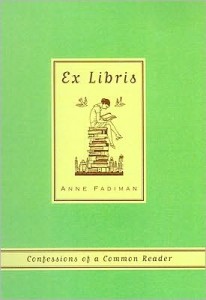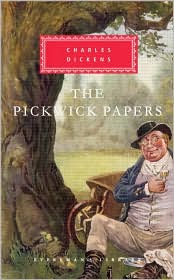 I’ve been keeping someone to myself much too long. I’ve collected reams of notes and have a stack of material. Now I feel somewhat prodded, thanks to Rose City Reader, who posted this review of Anne Fadiman’s “Ex Libris: Confessions of a Common Reader.”
I’ve been keeping someone to myself much too long. I’ve collected reams of notes and have a stack of material. Now I feel somewhat prodded, thanks to Rose City Reader, who posted this review of Anne Fadiman’s “Ex Libris: Confessions of a Common Reader.”
I left this comment on her post:
My copy of this book first belonged to my friend, Josephine, who was exactly twice my age when I first met her. She writes in pen in all of her books. She underlines words she doesn’t know, she makes little comments, she traces routes on maps, and on the very last page of every book she reads she signs and dates it and sometimes writes a short comment. It doesn’t matter if it’s a paperback or a gorgeous leatherbound edition from Easton Press. When I pointed this out, she shrugged and said simply she was a carnal book lover. When I was confused, she said I had to read this book and gave me her copy. In the middle of Fadiman’s essay about courtly vs. carnal book lovers, Josephine wrote in very scratchy script at the bottom of Page 40: “Mom used to use a bill to mark her place in a book. She told me to look through her books when she died. Yes, I found a few bills. I was astounded a couple of months ago to find $60 in a book I had read some time before. My mother’s daughter.” The last page is signed: “J.D.P. Jan. 16, 2009. Truly loved this book!” She was 92 years old at the time.
I first virtually met RCR after I had written a wacky story for a large publishing institution about the author Henry James and my struggles with my love/hate relationship with him. She was one of the very first people to send me an e-mail and she included her name and address. It turned out she lived around the corner from me and just a few short blocks away. We started an agreeable and sometimes hilarious e-mail exchange. We realized we had once worked together and she used to be married to someone I knew. And then she moved from the house around the corner. Into a house that had belonged to someone else I had known (and worked with).
It’s fitting that RCR would kick me in the rear to write about Josephine, because in addition to RCR’s note responding to the Henry James story, I received several e-mails and phone calls, but I got just one piece of mail. From Josephine.
I wrote way back when for the large publishing institution what her card said.
She had written a book. I tracked it down. And found a surprise inside. Then I tracked down Josephine.
After that I had always promised I would share what happened after I met her, but I kept it to myself. I got e-mails on occasion from people who had followed the story and kept in touch. They prodded me and wanted to know.
I visited Josephine every few weeks for many months, but I didn’t write a thing. Perhaps it was my own little indulgence. Or I worried I wouldn’t be able to do it justice. Or I couldn’t figure out the scope of it. Or I didn’t know where to start. Or it was apathy. Or perhaps it was my own uncertain battle with public vs. private.
I did know, however, that keeping silent perpetually disappointed Josephine, who proudly has a ham streak a mile wide.
Here’s a beginning. We’ll see if I eventually write more.
Meet Josephine.
*****
“I’m going to be stuck up for a while!” Josephine tossed back her head and laughed after I read aloud articles I had written about her and comments people sent to pass on.
 It was the first time I ever visited her in the tiny, tidy, one-bedroom apartment she shares with her granddaughter Amy not far from downtown Vancouver, Wash. She sat on a small bed with a few stacks of books around her, including “Plato’s Republic,” a nice leatherbound edition from Easton Press. Her twin bed takes up most of the room. A long, low bureau lines most of a wall under a window, and a few shelves beside it include books by Jane Austen, George Eliot, Charles Dickens and Dave Barry, and a bottle of Grand Marnier.
It was the first time I ever visited her in the tiny, tidy, one-bedroom apartment she shares with her granddaughter Amy not far from downtown Vancouver, Wash. She sat on a small bed with a few stacks of books around her, including “Plato’s Republic,” a nice leatherbound edition from Easton Press. Her twin bed takes up most of the room. A long, low bureau lines most of a wall under a window, and a few shelves beside it include books by Jane Austen, George Eliot, Charles Dickens and Dave Barry, and a bottle of Grand Marnier.
Amy’s bed is a twin mattress on the floor of the living room. It’s also the couch.
The first time I visited there wasn’t a chair anywhere in the apartment, so I threw my coat on the floor and sat next to it. Now I’m in the habit of looking around for a low wooden footstool and squatting on it. My coat still goes on the floor.
They now have a couple of different fold-up chairs that they bought for less than $10 at Goodwill and Target. There’s a counter that separates the small kitchen from the living room, but there’s no table.
 Josephine saves a few dollars every month to buy books. When I visited her on her birthday in December she had recently finished reading Leo Tolstoy’s “War and Peace.” She had started it in October. Now she was on Page 53 of a paperback copy of “The Pickwick Papers” by Charles Dickens. She can’t lift her arms very well and had trouble holding open the fat book, so as she finished reading each page she ripped it out and let it float to the floor.
Josephine saves a few dollars every month to buy books. When I visited her on her birthday in December she had recently finished reading Leo Tolstoy’s “War and Peace.” She had started it in October. Now she was on Page 53 of a paperback copy of “The Pickwick Papers” by Charles Dickens. She can’t lift her arms very well and had trouble holding open the fat book, so as she finished reading each page she ripped it out and let it float to the floor.
The first time I visited I took a small jar of pickles, bread and butters. Amy made chocolate chip cookies from store-bought dough. They were warm. I had never planned to go back again. But a funny thing happened.
Josephine handed me a stack of papers that were bound with a plastic spiral fastener. It was a collection of her poems and drawings. She had it ready for me, eager to share everything with someone she had never met before, and I marveled at her openness and zeal for publicity. I was holding in my hands a volume of her personal writings, and she completely trusted me without question. I was surprised. And something else, too. Honored.
I thumbed through the pages, glancing at the words, and carelessly, without thinking, I said, “I write poetry.” It was a throwaway line, something to elicit trust, as if to say, I understand and this book is in safe hands.
“I knew that,” she said just as automatically. Startled, my attention snapped into focus. I looked at her.
“How do you know that? I didn’t tell you.”
She got a distant, wistful look in her eyes. “I knew you were a poet. I could tell from your work.” Her eyes didn’t see me, and she said it again, sounding out each word carefully and quietly while she nodded her head. “I knew you were a poet.”
Then, much to my surprise, without any segue or introduction, she broke into reciting from memory one of her poems. A stunning gift.
April is National Poetry Month. Here’s one of my favorite poems:
REQUIEM
by Josephine Paterek
Not for me the narrow confines of wood, satin and brass,
Constricted silence … forever.
Rather, expose me to the leaping roaring flames,
My spirit curling upward from the ashy residue.
Then, fling me into the cold clean salty air,
And I sink down, down,
Past the darting glittering fish,
Past the undulating kelp.
Down, down through the darkness
To roll endlessly on the ocean floor.
Part of me rides the crest of the wave, tumbling in foam,
Sliding down the green slickness of a comber.
Part of me will reach the shore,
Caressing the shingle with the tidal surge.
Restless in life
Let me be restless in death,
Joined forever to the restless sea.